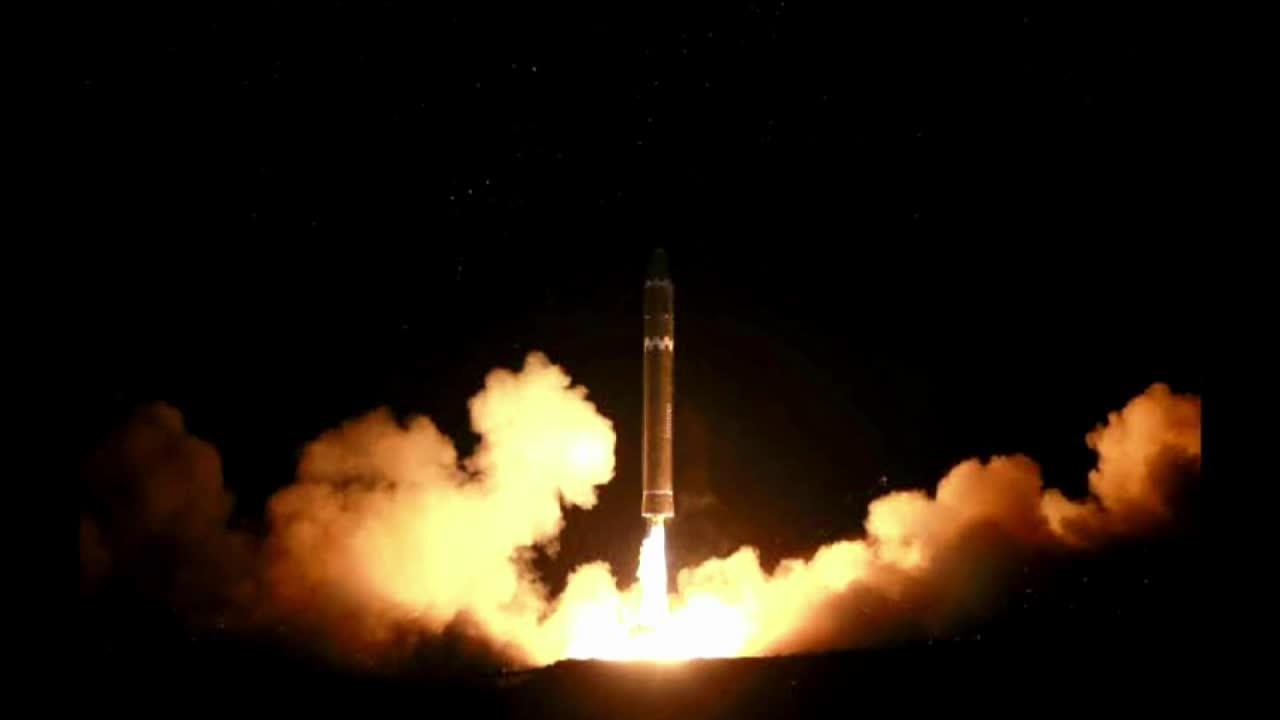
North Korea’s Hwasong-15 missile
The DPRK continues to prove its immunity to U.S. military threats by putting the entire U.S. within missile range.
The DPRK remains singularly unimpressed with U.S. displays of nuclear capability near its borders in the form of aircraft carriers and strategic bombers and has now sent the U.S. a message that it can also reach out and touch Washington with nuclear capability as well. Even if its latest missile has not technically been proven capable of delivering a nuclear warhead to Washington, the point is really moot because of several reasons.
Clearly, the DPRK’s nuclear and missile programs have been proceeding apace despite continual underestimation by outside powers. Additionally, the DPRK is a “hard target” in intelligence parlance, meaning it’s an exceptionally hard state to penetrate and decipher its leadership’s intentions. Even on a lower technical level, this is why it’s currently so hard to decipher the full extent of the DPRK’s current nuclear and missile capabilities. Lastly, even without a clear nuclear capability to target Washington, the DPRK has now changed the U.S.’ calculus with the ability to strike its capital even conventionally.
Previously, the U.S.’ “fire, fury and, quite frankly, power” threat to the DPRK was compounded by its infamous U.N. General Assembly speech threatening the DPRK with utter destruction. In the aftermath of the DPRK’s most recent missile test, this sentiment has been parroted in the U.N. Security Council. This is probably even “more” helpful than relabelling the DPRK as a state sponsor of terrorism. Additionally, the U.S.’ calling on all nations to sever diplomatic and economic ties with North Korea and calling for the U.N. to revoke North Korea’s seat at the organization is reflective of U.S. anachronism and its longing for yesterday’s past unipolar world order and inability to deal with today’s multipolar one.
The U.S. has called on China to implement an oil embargo against North Korea. First, previous sanctions on China itself for doing business with Russian oil and gas interests, as well as threats of further sanctions against Chinese entities themselves suspected of enabling the DPRK’s weapons programs probably will not motivate China to comply with U.S. wishes now. More importantly, the last time an oil embargo was implemented against an Asia-Pacific enemy of the U.S., it didn’t turn out too well (initially) for the U.S..
Over the years, it’s been speculated that the U.S. oil embargo was put in place against Imperial Japan precisely to provoke it into attacking the U.S.. If this current proposed oil embargo purports to follow the same strategy, then, sadly, this will be yet another in a long line of “remember” events twisted to play on raw domestic emotions and then eventually leveraged to pursue long-standing geopolitical objectives. These include “Remember The Alamo!”, Remember The Maine!”, Remember The Lusitania!”, along with Pearl Harbor, the USS Maddox Incident/Gulf of Tonkin Resolution, and, of course, 9/11.
Calling on Russia to help implement sanctions against the DPRK is also a non-starter given current U.S. veto-proof sanctions against Russia itself. The problem with the DPRK is now compounded due to the U.S.’ inability and/or unwillingness to consider either China’s or Russia’s security interests on the Korean Peninsula. Also, with respect to Russian interests, the Ukraine Crisis, the Syrian Crisis, and the Afghanistan quagmire all remain firmly within the U.S.’ own inbox. In short, Russiagate and its concordant domestic politics has thoroughly emasculated U.S. strategic foreign policy.
Military options aren’t going to work, ditto covert actions due to the DPRK’s “hard target” status mentioned above. Repeated sanctions over the years have only made the DPRK even more adept and resourceful at evading them. Sanctions, either unilaterally through the U.S., or multilaterally through the U.N., are not going to work now because they’ve never worked before. The argument that the DPRK will eventually be brought to the negotiating table like Iran is facile thinking at its worst. This enfeebled foundation is the support base for continued wishful thinking that sanctions eventually will hurt the North Korean people and/or elite so much that they will initiate regime change themselves (the modus operandi behind Russian sanctions as well).
The only option left with respect to the DPRK is earnest negotiations, with China and Russia’s “double freeze” proposal a possible option. Needless to say, these won’t be easy as the U.S.’ non-certification of the Iran nuclear deal (JCPOA) has only given the DPRK even more reason to not trust the U.S.. Lastly, no matter who is actually in charge of the U.S.’ diplomatic efforts, this initiative needs to be sincere. Any U.S. approach trying to condition talks on immediate DPRK denuclearization, for example, will only waste even more time than that which has already been wasted thus far.